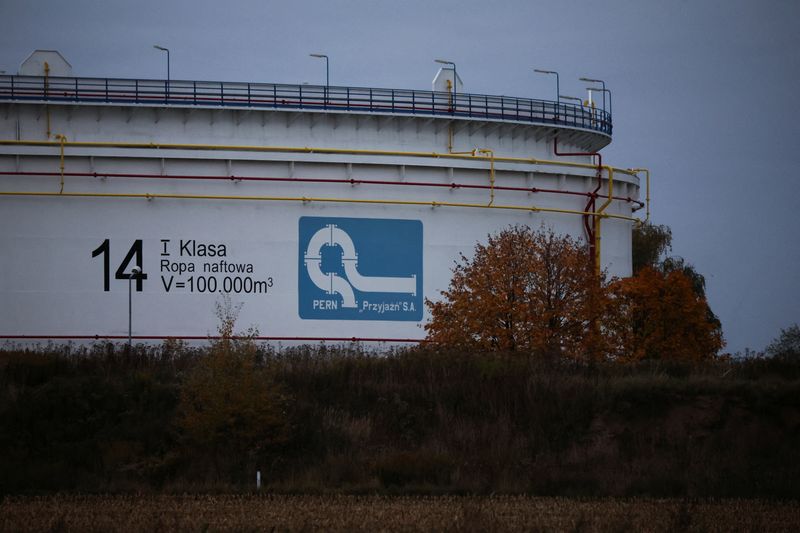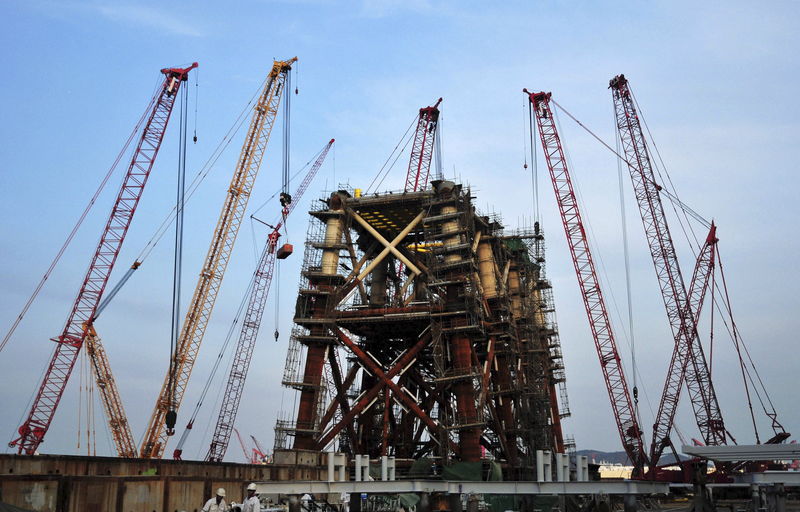By Marek Strzelecki and Miranda Murray
WARSAW (Reuters) -Germany said on Wednesday it was receiving less oil but still had adequate supplies, after Poland found a leak in the Druzhba pipeline that delivers crude from Russia to Europe that Warsaw said showed no sign of being caused by sabotage.
The discovery of the leak in the main route carrying oil to Germany, which operator PERN said it found on Tuesday evening, comes as Europe is on high alert over its energy security in the aftermath of Moscow's invasion of Ukraine which has cut supplies of gas.
"After removing most of the contaminants from the area near the crude oil pipeline that was damaged yesterday, PERN's technical services have located the site of the leak," Polish pipeline operator PERN said in a statement.
"The first findings and the method of pipeline deformation show that at the moment there are no signs of interference by third parties."
PERN added that it was working to find out what caused the leak and to repair the pipeline.
Drone footage showed a black stain of oil from the underground pipeline spreading across farmland at the site of the leak, surrounded by fire engines and other emergency teams.
"Security of supply in Germany is currently guaranteed," an economy ministry spokesperson told Reuters. "The refineries in Schwedt and Leuna continue to receive crude oil via the Druzhba pipeline."
The Schwedt refinery, which supplies 90% of Berlin's fuel, said deliveries were taking place but at reduced capacity.
Germany said it was hoping for more information soon from Poland about the cause of the leak and how it can be repaired.
Europe has been on high alert over the security of its energy infrastructure since major leaks were found last month in the Nord Stream 1 and 2 gas pipelines running from Russia to Europe under the Baltic Sea. Both the West and Russia have blamed sabotage.
The top official in charge of Poland's energy infrastructure, Mateusz Berger said the leak was located 70 km (44 miles) west of Plock, where Poland's biggest refinery owned by PKN Orlen is located. As a result, part of the pipeline's capacity towards Germany was not available, he said, adding that repairs would likely "not take long".
RUSSIA REMAINS TOP GERMAN OIL SUPPLIER
The Druzhba oil pipeline, whose name means "friendship" in Russian, is one of the world's largest with the capacity to flow 2 million barrels per day, supplying Russian oil to much of central Europe including Germany, Poland, Belarus, Hungary, Slovakia, the Czech Republic and Austria.
Russia's Transneft state-owned pipeline monopoly said it was continuing to pump oil towards Poland.
Poland's PKN Orlen said that supplies to its Plock refinery were not interrupted, while Czech pipeline operator MERO had not seen any change in flows to the Czech Republic.
"The main action (we are taking) is to pump out the liquid and locate the leak and stop it," fire brigade spokesman Karol Kierzkowski told state broadcaster TVP Info, adding there was no danger to the public.
Firefighters in the mid-northern Kujawsko-Pomorskie region of Poland said they had pumped about 400 cubic metres of oil and water from the site, which was in the middle of a corn field.
The second line of the Druzhba pipeline was working as normal, PERN said.
The total capacity of the western section of both lines that carry oil from central Poland to Germany is 27 million tonnes of crude oil per year.
Germany's Schwedt refinery, which serves Berlin, will struggle the most if Druzhba supplies are interrupted as it has few alternative options to service its crude needs.
The German government aims to eliminate imports of oil from Russia by the end of the year under European Union sanctions. But in the first seven months of the year, Russia was still its top supplier, accounting for just over 30% of oil imports.
As Germany looks for alternative supplies for Schwedt, Druzhba could be instrumental in supplying oil via the Polish port in Gdansk.

The German government has been in talks to secure oil from Kazakhstan to supply Schwedt, but that oil would have to flow to Germany via the Druzhba pipeline too.
Berlin has rejected an offer from Russian President Vladimir Putin to supply gas to Europe via Nord Stream 2 this winter - the new pipeline which Germany refused to allow to be put into operation. If Russia wanted to send gas, it could do so via Nord Stream 1, a government spokesperson said.
